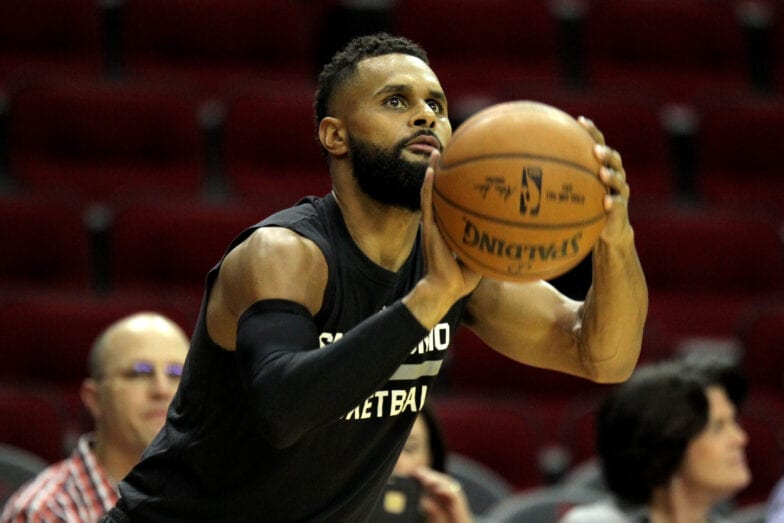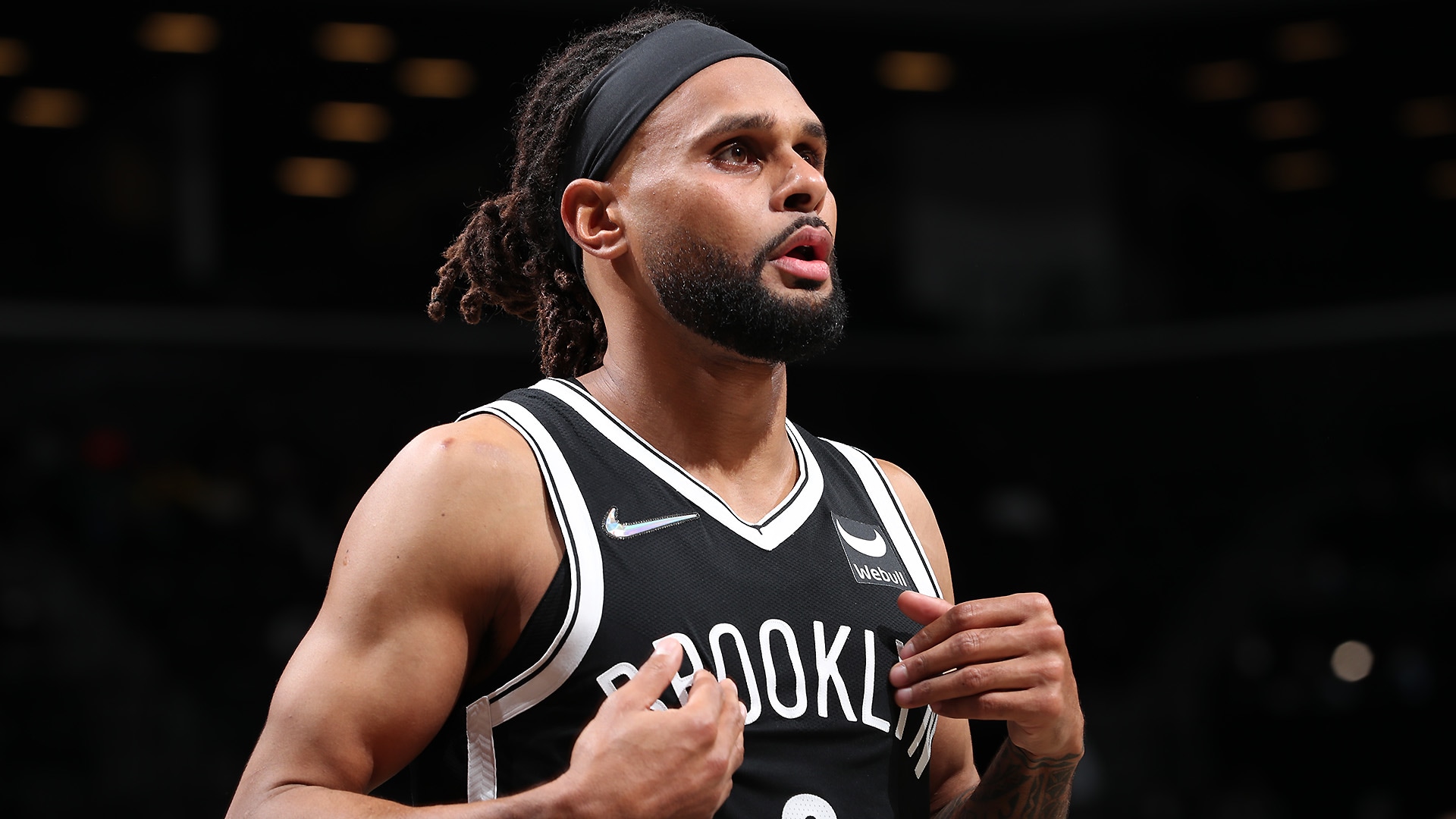
The Boomers were devastated. Australia’s national men’s basketball team made its pursuit of a first Olympic medal in Rio in August something of a Quixotic quest. They’d spent months together in between their various professional seasons around the world, including a week-long trip to the country’s Northern Territory early in the summer to see Uluru, aka Ayers Rock, a powerful symbol for Australia’s indigenous population in Uluru-Kata Tjuta National Park.
The bonding trip was the idea of Patty Mills, the Spurs’ guard and one of the leaders of the national squad. Now 28, Mills had earned a starring role for Australia as he became one of the NBA’s best reserves, topped with a dominating performance for San Antonio throughout the 2014 Finals against Miami, including his 17 points off the bench in the Game 5 clincher. That standing transferred back home, where Mills has been a vocal advocate for the indigenous — the mix of Torres Strait Islanders and Aboriginal peoples who were denied rights as landowners by the European inhabitants who came to populate Australia in the late 18th century. Mills has a connection with all of those civilizations, which is why the Uluru trip was so important to him and his teammates, which included NBAers Andrew Bogut, Matthew Dellavedova, Aron Baynes and Joe Ingles.
But Australia’s quest fell agonizingly short of a medal in Rio — a close loss to the U.S. team in preliminary round play, an inexplicable blowout loss to Serbia in the semifinals and a last-second loss to Spain in the bronze medal game in which Mills scored 30. Mills returned to the States and the Spurs, where he has a bigger leadership role, as Tony Parker, Manu Ginobili and all of San Antonio’s other returning veterans do, without Tim Duncan around for the first time in almost 20 seasons.
Mills and Ginobili remain the catalysts for a rebuilt Spurs bench that no longer has Boris Diaw (traded to Utah) or longtime Spur Matt Bonner playing. Coach Gregg Popovich says this isn’t quite as good a bench as a few years ago, when Ginobili was a top-15 player in the league who nonetheless agreed to play as a reserve. And that’s true; the Spurs have had some incredible benches in years past, with Ginobili and Diaw and Tiago Splitter and Mills spacing and pacing.
Their bench this season isn’t as experienced, but it’s a lot more athletic, with Dewyane Dedmon and rookie Davis Bertans and a seemingly rejuvenated David Lee filling lanes and throwing hammers. (Then there’s Jonathon Simmons…Jeebus. And…Jeebus, Part II: The Quickening). But Mills and Ginobili each bring not only their experience, but their experiences as men and leaders in their native countries, to the new-look Spurs this season.(endital)
Me: How have you taken the leadership role that you had on the national team these past couple of cycles and applied it here, especially this year, without Timmy here?
Patty Mills: First and foremost, you’ve got to understand what Timmy has built here for so long. I think that’s where it starts, to know what he’s built and to be able to give him confidence to walk away, knowing guys that will be responsible for carrying on what you’ve built here. And I felt that was a big part of my leadership, to be able to step up to say I’ve got you, Timmy. And we’ve got you. And to be able to carry on the legacy that he’s brought here, and to be able to keep it going, hopefully for a long time.
Me: You invited the entire Australian team to Uluru before the Olympics to help with team building. Did you try to do anything similar before this season with the Spurs?
PM: Not to the extent. But we’ve done multiple things to try and keep us, I guess, on that same page. But that’s what it’s become for me, the Spurs’ organization. It’s become, what it means for me to play for Australia, it’s become the same thing for me with the Spurs. Understanding what it means to be a San Antonio Spur, understanding what it means to play for the name on the front of your jersey. I’ve grown a lot in my time in San Antonio, both on and off the court, and probably off the court most importantly. And that’s why I carry myself the way that I do for this organization.
Me: How much do you take from Tony’s leadership?
PM: Oh, a great deal. I mean, he’s been such a great role model for me, in how to, I guess, grow as a point guard in this environment. He’s definitely taken me under his wing and helped me grow along the way. It’s been great to have. That’s why I feel so lucky to be in this environment, around guys like him, and I have Timmy and I have Manu. But like I said, the more important thing is to be able to grow off the court as a person, I think, almost trumps everything else.
Me: Coach (Ettore) Messina (the Spurs’ assistant and legendary European coach) was talking about the importance of dinners — especially after losses. You haven’t lost a lot yet this year, but what do you all take from those group encounters?
PM: I love that. I don’t know if everyone loves it as much as I do, but it’s such a great way to get to know your teammate, you know, who you’re fighting with out on the court. You find out so much about your teammates, and in an environment where it’s comfortable enough for everyone to be able to let their guard down and be themselves, that kind of deal. I love it. And definitely make the most of it, for sure.
Me: Is that especially important for Dejounte Murray or some of the other rookies, to be made to feel comfortable?
PM: Rookies, for sure. But it’s everyone. When you look around the room, you have so many guys that have unique stories, that are so interesting, that you want to find out more about it. It’s rookies, yeah. But you have [Davis] Bertans’ story, you have Jon Simmons’ story, LaMarcus’ story, Pau (Gasol), D-Lee (David Lee), you go around the room. For me, I want to learn about everyone. So it’s great to sit around different tables and find out about them.
Me: It seems you have such a different bench this season than in years past — much more athletic.
PM: It is. Not only athletic, but I guess it’s the energy factor, you know? And what we’ve said is no matter how the first group starts, whether they start great or not, we’ve got to be able to bring that consistent energy, no matter what the score is. I think we grabbed hold of that earlier on, to know we can play throughout that juice and energy level.
Me: Are you more in playmaking mode than in years past?
PM: To be honest, and I said it earlier, that leadership value that I’ve focused on a little more, and trying to get guys to understand the culture and buy into the system — whether it’s learning the offense or the terminology, or the defense, whatever it may be — I think that’s kind of automatically put me in that mode. Which is good. And I definitely am trying to make the most of it at the same time.
Me: What did you take from the town hall meeting last week with Cornel West and with Dave Zirin of the Nation?
PM: I loved it. I loved it. I related to my situation, with the indigenous people back home, and just tried to see what I could pick from (West’s) brain, and how he carries himself, and put it into that situation. ‘Cause I guess there is that concern. Although we are a commonwealth country and we are completely different, it’s America. And Americans have that influence, whether it is good or bad, on the rest of the world. So I guess that concern, the stuff’s been said, how’s Australians going to react to it? Does that give them the freedom of speech to say certain things, and if so, how are we indigenous going to handle those sorts of things? That’s definitely the concern, and hopefully we can handle it the right way.
Me: Have you gotten past Rio yet, or does it still bug the hell out of you?
PM: To be honest, I haven’t. And although I’m teammates with one of the guys (Gasol, as ever, starred for the Spain team that beat Australia in the bronze medal game), it hasn’t come up. That’s going to sting for a little bit more.
Me: So, you’re definitely playing in ’20?
PM: Yeah, for sure. There’s no doubt about it. To know that we were that close, we’re not satisfied one bit at all. So we’ll have another shot at it.
TWEET OF THE WEEK
When the Thanksgiving Meal was too good the night before #BelowTheRim pic.twitter.com/hJy3PVOg3o
— Stephen Curry (@StephenCurry30) November 26, 2016
— Stephen Curry (@StephenCurry30), Saturday, 4:03 am, after his sojourn to the front of the rim against the Lakers Friday night in L.A. ended unsuccessfully.
THEY SAID IT
“That was a pathetic performance on the part of the Spurs. They had some guys out. We had some guys out. But they had a lot more out than we did. I felt we showed a lack of humility, a lack of respect for the opponent. A very pathetic performance at both ends of the court, both in execution and in grunt, fiber and desire. It was an awful performance.”
— Gregg Popovich, after his Spurs played the Mavericks Tuesday night in Dallas. Did I mention that the Spurs beat the Mavericks, won — won — Tuesday night over Dallas, 96-91, to give him his 1,100th victory as a head coach.
“This team has a lot of Cowboys’ fans. Blake kind of goes with whoever the team’s in first, and he actually says that, so at least he’s honest about it. But Chris and DJ and Woody, I don’t understand how they all became Cowboy fans, but they are.”
— LA Clippers Coach Doc Rivers, on why his team opted to stay in Dallas last Thursday after beating the Mavs on Wednesday — and with a game upcoming in Detroit on Friday — to attend the Cowboys-Redskins game on Thanksgiving afternoon at AT&T Stadium. The Clippers left for Detroit after the Cowboys’ 31-26 victory.
“Like I tell everybody, I’m going to give you a three-joke maximum. You’ve got three jokes. They better be good. After that third one, I’m going to be on you.”
— Miami Heat center Udonis Haslem, explaining why he confronted a heckling fan in Detroit on the sidelines in the waning moments of the Pistons’ blowout win over the Heat last Wednesday. Haslem said the fan began ripping on him from the moment he entered the game in the fourth quarter, and that he remained in the arena even after supposedly being removed by security.
More Morning Tip: Labor peace on horizon? | DA’s Top 15 Rankings | Memories of The Palace at Auburn Hills
Longtime NBA reporter, columnist and Naismith Memorial Basketball Hall of Famer David Aldridge is an analyst for TNT. You can e-mail him here, find his archive here and follow him on Twitter.
The views on this page do not necessarily reflect the views of the NBA, its clubs or Turner Broadcasting.









